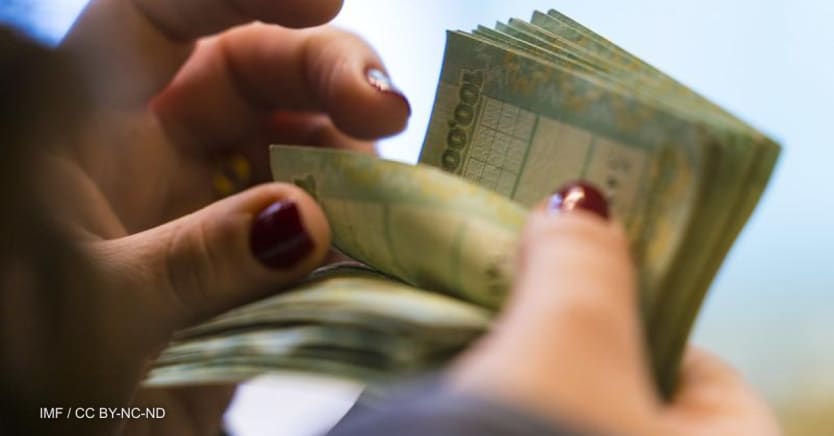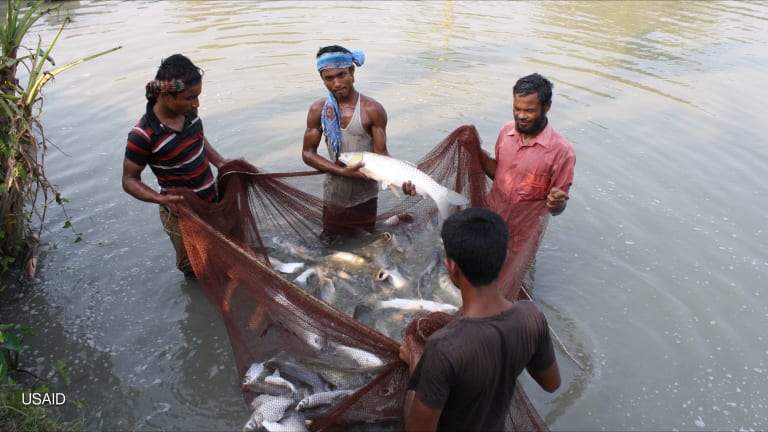
BEIRUT — International donors are pouring millions of U.S. dollars into cash-strapped Lebanon, where an economic crisis has plunged over half the population into poverty and the local currency — the Lebanese pound — has lost over 85% of its value to inflation since 2019.
Humanitarian aid groups and their clients are facing a currency crisis exacerbated by the use of multiple exchange rates in the country. Lebanon’s central bank requires aid groups to use exchange rates far below what is common in the market — while the country’s financial sector pockets the difference. Complicating matters further, different exchange rates apply to different organizations.
Cash aid to Palestinian and Syrian refugees, along with impoverished Lebanese citizens, is distributed in pounds. This means their purchasing power has diminished significantly at the same time that prices are rising because of inflation. For example, the International Rescue Committee’s five-month winter cash assistance program for Syrians, worth $575 in 2014, is equivalent to only about $180 today. Meanwhile, food prices have soared by more than 400% over the past year.
“The situation for children is just heartbreaking. A number of families are calling our nutrition hotline, saying they are not able to feed their children because of the increase in prices,” said Amelia Charles, technical adviser on social protection, food security, and livelihoods for Save the Children in Beirut. “There is fatigue around humanitarian support to Lebanon and a lack of understanding that it is no longer a middle-income country.”
Lebanon’s government has yet to pass a capital control bill to regulate cash withdrawal restrictions. In fact, many members of Parliament have outright blocked it.
Many aid groups are left to negotiate with their respective banks for more favorable conversion rates to maximize how much their clients receive. Calls for a “harmonized” exchange rate for their work haven’t gained traction, nor have appeals by some groups for aid to be distributed in dollars.
Humanitarian organizations are alarmed for the roughly 1.5 million Syrian refugees in Lebanon and the growing number of vulnerable Lebanese whose living conditions have worsened with the COVID-19 pandemic.
“We had some small scale-ups of funding [since the economic crisis escalated in 2020], but it doesn’t meet the skyrocketing needs,” said Natasha Sax, coordinator for protection and rule of law at IRC in Beirut.
Sax fears that more families will resort to negative coping mechanisms, she said, predicting “more suffering, more child labor, more child marriage, more people cutting food rations.”
Multiple exchange rates
Almost two years into the financial crisis, with political deadlock and no viable economic recovery plan in sight, Lebanon has amassed at least four different rates for exchanging pounds into dollars. This has confused and angered consumers and producers alike.
Lebanon’s central bank pegged the pound at 1,507.5 to the dollar in 1997. After that, the pound and dollar were used interchangeably. But by mid-2019, the artificial peg was no longer stable due to a shortage of dollars. The devastating Beirut port explosion in August 2020 and COVID-19 further pummeled Lebanon’s economy.
The official exchange rate remains 1,507.5 pounds to the dollar, but this is no longer used in the open market. In June 2020, commercial banks raised their exchange rate to a slightly less punishing 3,900 pounds to the dollar. This is the rate most humanitarian organizations in Lebanon must use.
Third, there is the so-called humanitarian rate, which is equivalent to 6,240 pounds to the dollar. The central bank applied this rate to the World Bank, which is loaning Lebanon $246 million to provide cash transfers to vulnerable families while the government gradually lifts an expensive and unsustainable subsidy program on fuel, medicine, flour, and some other food items. Under the agreement, aid will be handed out in pounds. The World Bank, European Union, and United Nations have pushed for aid to be distributed in dollars instead.
Since February, the 6,240 rate also applies to U.N. agencies such as the World Food Programme and UN Refugee Agency — but it does not apply to grassroots groups or most international NGOs. And while it is better than the 3,900 rate, a significant amount is still lost to the financial sector in the exchange.
But what dominates the Lebanese market is the informal rate — known as the black market or parallel market rate — which frequently fluctuates, sometimes daily. In March, the value of the pound hit an all-time low of 15,000 to the dollar. It currently fluctuates between 12,000 and 12,500.
“So far, the preferential rate we are using is 50% lower than the market,” Lisa Abou Khaled, a spokesperson at UNHCR, told Devex. “But we continue to advocate to obtain a better preferential rate.”
Lebanese authorities have tried to penalize currency exchangers using the informal rate and shut down websites and mobile apps that share them, but to no avail.
“The value of the assistance is decreasing on a daily basis because the rate is rapidly fluctuating,” IRC’s Sax said. “Poor households spend the majority of their income on food, so food inflation has had such a devastating impact.”
A ‘common humanitarian rate’?
“The optimal solution is to have a unified and sustainable exchange rate that reflects fundamentals of the Lebanese economy, as part of a macroeconomic stabilization strategy,” a World Bank spokesperson told Devex. “Short of this, a suboptimal solution is to disburse dollars, which can maximize the number of beneficiaries and the monetary value of the benefit while also guaranteeing a store of value and can minimize macroeconomic distortions.”
Humanitarian agencies, including Save the Children, have advocated for a “common humanitarian rate” that would satisfy the Lebanese government, aid organizations, and international donors.
“A number of families are calling our nutrition hotline, saying they are not able to feed their children because of the increase in prices.”
— Amelia Charles, social protection, food security, and livelihoods technical adviser, Save the Children“Humanitarian organizations are putting millions of dollars annually directly into the hands of consumers,” Charles said. “Based on that, we should have a harmonized and coordinated rate for humanitarian actors’ cash programming.”
For now, however, there have been no indications from the central bank that this will happen anytime soon. While families would benefit from cash assistance with more purchasing power, some economists say increasing Lebanese pounds in the market could contribute to inflation.
Aid groups say it’s not as simple as distributing cash assistance in dollars or adjusting distributions to match the informal rate. In addition, tracking the informal rate is unsustainable and would not fall in line with donor compliance and financial best practices.
“It’s been tolerated by the government, but there is a lot of uncertainty about how legal the parallel market is,” Sax said. “Our cash program is based on ‘do no harm,’ so we cannot empower the parallel market and contribute to inflation.”
Distributing aid in dollars could bring a new set of problems — some that may put clients in danger. Dollars are scarce in Lebanon. Instead of directly spending them, people exchange them at the informal rate with an unlicensed merchant in unprotected settings.
“With dollars, you would transfer risks to the beneficiaries,” said Dima Wehbi, adviser on policy, advocacy, and communications at IRC. “It might be a bit easier for Lebanese families, but how would Syrians deal with that? There are a lot of unknowns.”
Armed crime in Lebanon has surged. From street muggings to shoplifting diapers, many have been forced to survive by any means necessary. Carrying dollars often puts people at risk.
“There is also a perception that refugees get more assistance than Lebanese, especially in this current situation,” Wehbi said. “Social cohesion is deteriorating in Lebanon, and we don’t want to contribute to that.”








